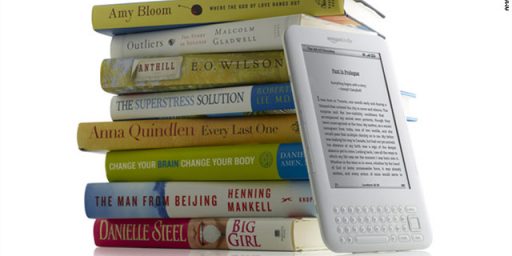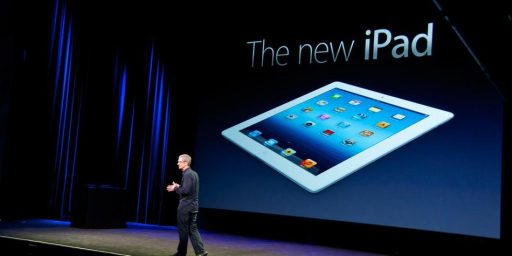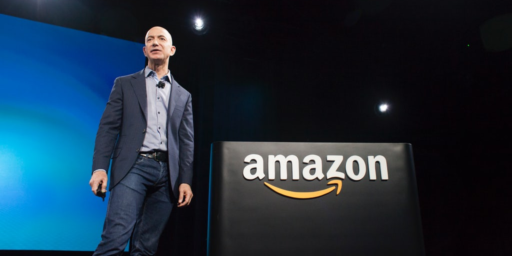Amazon: Kindle E-Books Outselling Paper Books
Electronic books outsold paper books on Amazon over the past three months, but the death of the hardcover is greatly exaggerated.
An interesting sign of the times:
Amazon.com said Monday that growth in sales of its Kindle digital reader accelerated every month in the second quarter and that it’s selling more electronic books than hardcover editions.
The pace of Kindle sales also has tripled since the Internet retail giant cut the price on the device to $189 from $259, Amazon chief executive Jeff Bezos said in a statement.
Announced last month, the 27 percent price cut was aimed at helping Amazon fend off a threat from Apple’s iPad tablet computer, which includes book-reading tools. Amazon hasn’t disclosed Kindle sales since releasing the device in 2007, saying only that it has sold millions. Its release of growth figures may be aimed at quelling concern that the iPad has crimped Kindle demand, according to Dmitriy Molchanov, an analyst at Yankee Group.
“There’s a real perception that the iPad has completely squashed the e-reader space and that’s really not the case,” said Molchanov. “Amazon is doing really well and both companies can profit at the same time.”
Amazon said it sold more than triple the number of Kindle books in the first half of the year as it did in the comparable period last year. More than 81 percent of its 630,000 electronic books cost $9.99 or less.
“We’ve reached a tipping point with the new price of Kindle,” Bezos said in the statement. “Amazon.com customers now purchase more Kindle books than hardcover books — astonishing when you consider that we’ve been selling hardcover books for 15 years, and Kindle books for 33 months.”
In the past three months, Amazon has sold 143 Kindle books for every 100 hardcover books, the company said. In July, sales of e-books accelerated to 180 sold for every 100 hardcover versions. Kindle book sales this year have also exceeded broader e-book sales growth, pegged by the Association of American Publishers at 207 percent through May, Amazon said.
So does this mean that the printed book is on the road toward suffering the same fate as printed newspapers and magazines are so clearly headed toward ?
Probably, but it will probably take longer for books to succumb to technology than it’s taken the newspaper industry. For one thing, e-readers, whether it’s the Kindle or the iPad or Barnes & Noble’s Nook, suffer from the same problem that home video had when it first came out — to many incompatible formats. If I can only buy books for my Kindle at Amazon, that somewhat undercuts the usefulness of the device itself. While the iPod and iTunes do somewhat undercut the idea that you can’t have a proprietary delivery system, I don’t think that the model that’s worked in the music world will translate over so well in the world of books.
The other problem is that there’s still something that printed books offer that their electronic counterparts don’t — ease of use. I can take a paperback anywhere without worrying about whether I have access to a power outlet, or a WiFi connection. I can hold it in one hand while eating a sandwich with another. And, if I lose it, replacement costs are rather low.
Finally, call me old-fashioned, but there’s something satisfying about holding a book in your hand that technology probably won’t ever be able to replicate. So, keep your Kindle Amazon, I’m quite happy with what I’ve got right now.
Update: As someone has already pointed in the comments below, these sales figures only apply to hardcover books, not paperbacks. Since most of Amazon’s Kindle-version prices are below the price of a hardcover, though, one has to wonder if they are eating into that market as well If/when e-book prices start reaching paperback range, one wonders if they’ll have the same impact on that market.







Improper headline 😉
The hardcover market is different, and sure I could see how “they” would have kindles.
I say this as primarily a library reader or paperback buyer.
I haven’t used a Kindle, and I can see the advantage in having them in some settings-I think it would be great for college students (maybe not as great for the college textbook industry, but I cant helpo but think Kindle versions of college textbooks would be cheaper and easier to use than having a stack of books). I suspect the first paper books to go will be college textbooks.
I don’t think electronic book readers are going to totally put an end to paper book publishing.
For one thing I think there are always going to be people like me who would rather have the book in their hands than read an electronic screen, and there are just some situations where a paper book makes more sense (I wouldn’t haul an e-reader to the beach or swimming pool-a $7 book is a lot cheaper easier to replace).
Your ease of use argument is faulty. As a Kindle reader I can tell you that the major advantage is ease of use. I carry it in my purse all the time. Rather than carrying a bag of books on vacation, I have 200 in my purse. Don’t have to have WiFi- the Kindle use Sprint wireless, but you can download from your computer instead. I can’t use the wireless download where I live, no Sprint access, but I can download in a minute of two on my computer. Long battery life if the antenna is turned off, so only need to plug it in once a week or so. If you have a leather cover, just as easy to hold as a paperback book. I think the disadvantage of the iPad will be its bulky size.
Vicki,
I don’t have to pay Sprint wireless to read my paperback copy of Stephen King’s Under The Dome 😉
I’m surprised you didn’t fix it while I was out for my morning constitutional (what a great old word). “Kindle E-Books Outselling Paper Books” is false.
Paperbacks are made of paper aren’t they ?
I updated the post to make the clarification, but for several reasons I am generally loath to make changes to post titles unless they’re clearly called for
Aren’t you backwards?
“these sales figures only apply to paperback books, not hardcovers”
BTW, I do think beating hardcover is an accomplishment, but as I say I think hardcover sales might be getting hit from a few directions. Recession. Libraries. Internets. Paperbacks. And yes, Ebooks.
Ah, here are some industry numbers for 2009:
Total unit sales: 724 million
Hardcover fiction: 36 million units
Trade paperback: 79 million
This was pretty much pre-kindle, but:
“Ms. Shanley added that when e-books were taken into account, industry sales were essentially flat with 2008. E-books are generally considered to make up between 1% and 3% of total book sales.”
http://www.crainsnewyork.com/article/20091229/FREE/912299989
Yea I did get that flipped around. Fixed now.
Interesting about the industry totals. Obviously, Amazon’s numbers may differ because they appeal to a tech-savvy consumer
There is also the reversal of instant gratification. When Amazon first went against bricks-and-mortar bookstores they had lower prices and a bigger selection … but you had to wait. Now Amazon can give you the book “now” (faster than a drive to the bookstore). Nook potentially has the best of both worlds on that.
I don’t e-read now, but might, when I’m finally seduced by a “pad” device. Probably android, and open formats.
As a person always late to the gadget market and as mostly a reader of science and math books which I highlight and mark up in the margins, how do the electronic books stand up? Especially for keeping as reference in future work. Then again how many of the books I want are actually in electronic form yet? Do you think college texts, which are criminally overpriced, will actually be available in electronic form and, again, how many can be stored for reference?
I just recently bought a kindle and so far I’m pretty impressed. The ebook fees are in the range of getting a paperback for most of the books I’ve looked at and I assume the Sprint fees mentioned are built into the price of the books, because I don’t have an account with Sprint and I’m not interested in getting one. I have had to donate of any number of books over the years because of lack of storage space or being unwilling to move them to a new house and I’ll be happy for the storage capabilities alone.
That being said I won’t get rid of real books any time soon, just limiting my purchases to books I find really important or that I think are works of art. Autographed books, illustrated books, etc. I have a leatherbound collection of The Hitchhiker’s Guide to the Galaxy and a Harper’s illustrated Guide to the Civil War that wouldn’t be the same on a Kindle.
Doug,
As I understand it, while the Kindle may use the Sprint network, the connection is free. As such as long as one isn’t in a dead zone, one has constant contact with the Kindle bookstore for free.
Also, another slight error in your post: since there is Kindle software for computers, iPhones and iPads, there is less cross-platform problems than you suggest.
Doug, Vickie doesn’t have to pay Sprint to read a book on her Kindle, either. There is no subscription charge for the wireless connection.
And as Kindle owner, I’ll have to agree that you’re dead wrong on the ease-of-use issue. You’re imagining problems that don’t really exist. You only need access to electricity on rare occasion, you don’t need Sprint access except to download books directly to your Kindle, and you can certainly hold a Kindle in one hand while eating a sandwich with the other.
So basically (and I mean this in the nicest way possible, but there’s really not another way to say it), you have no idea what you’re talking about when it comes to Kindles.
Sorry to disagree, but e-books will kill dead tree books sooner than many think. It is happening now and it will accelerate.
A dead tree book goes like this: author-publisher-printer-shipper-warehouser-distributor-retailer-reader.
The e-book system currently works like this: author-publisher-etailer-reader.
Increasingly it will go like this: author-etailer-reader.
E-book prices will drop — the effort by the legacy publishers to hold the $9.99 line is already failing — and Barnes and Noble will not be able to compete. (B&N is already desperate to move more of its sales out of stores to their on-line store.)
It is not true, incidentally that Kindle books require a Kindle — they can be bought and read on an iPhone or iPad.
Downward price pressures will mortally wound the dead tree business. The advent of the enhanced e-book (music, social networking, video, pix, commentary) will finish the job.
I’ve been hammering my publisher on this for years now, warning that straight-text ebooks meant we writers could self-publish and cut publishers out of the loop. Been trying to get them to take enhanced ebooks seriously as a product where they could leverage their assets and stay in the game. But a lot of publishers won’t be around 5 years from now.
For purely selfish reasons, I hope e-readers take off and e-reader-readers donate their book collections to the nation’s thrift stores where I can pick them for cheap.
Of course, I have very little use for the big new hot bestseller. Sorry Dan Brown and John Grisham, I’d rather curl up with an old John D. Macdonald novel that’s been out of print for 40 years.
Herb:
One of the great advantages of ebooks: the phrase “out-of-print” will be obsolete. Ebooks need never disappear from the retail environment.
Ebooks will mean: every book, everywhere, forever, and cheap.
And thanks to the publishing lobbyists, copyright will be forever.
That might work in your case, Michael, since you’re an established writer, but I question whether it would work for most authors (particularly beginning authors, considering the stigma against self-publishing your own books for sale).
(My preference would be for a fixed 50 years, for all forms of copyright, including fine art. That would allow plenty of time for creators to profit from a work, without restraining the advancement of knowledge.
Most of my works are under copyright, but so far no one really cares when software goes out of date. By then it is out of date. I have done some open source work, but that is a minority of my effort.)
“Ebooks will mean: every book, everywhere, forever, and cheap.”
I don’t doubt publishers’ commitment to “every book, everywhere, forever,” but I do doubt their commitment to cheap. Many publishers want to charge hardcover prices for e-books now and I say “HELL NO.”
They’re using 100% less paper, 100% less glue, 100% less ink, 100% less cardboard, much less labor, drastically reduced transportation and distribution costs….and they want to charge the same price?
Cheaper for them…same price for me. No thanks….
One thing I can do with a book, soft or hardcover, I can swat the shit out that fly that’s bothering me as I try to read. Betcha won’t do that with a Kindle.
Kindles (and I assume other devices) can read PDFs and there are converters to translate between the various formats.
Herb:
The publishers won’t be in control.